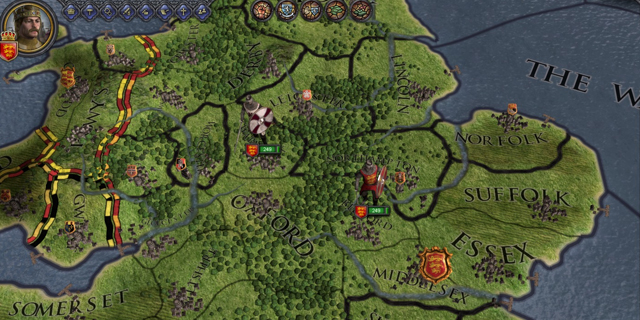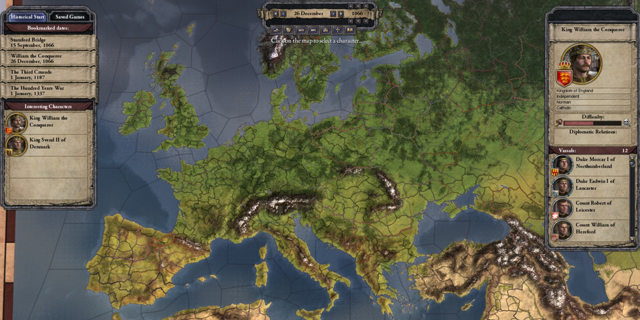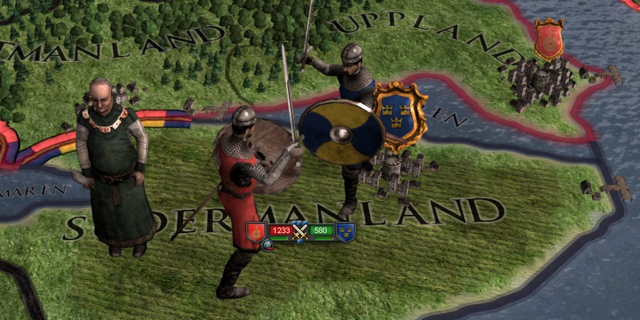
One thing I love about PC games is how so many niche games can manage to not just exist, but remain financially profitable, largely thanks to Steam and other digital storefronts. Crusader Kings II is a so-called “grand strategy” game, one of many released over the last decade or so by Paradox Interactive, and it’s another example of a success that didn’t get there by bending to the whims of the mainstream.
Crusader Kings II is unique among strategy games in that you aren’t playing a nation, but a dynasty. The focus of the game isn’t achieving any pre-set goal, but amassing the most ‘prestige’ through successive generations of your chosen lineage, based on the success of each of your rulers at the time of their death. If you die with no heirs, your game is over. The game will actually continue, even if you suffer a crushing defeat, if you hold at least one piece of land, and as long as you have an heir to inherit your lands and titles when your ruler dies.
The game spans the years 1066 to 1453, though you can start a new game as late as 1337, if you so choose. The game plays in real time, though at a much slower speed than a full real-time strategy game. This isn’t a game about action or furious clicking. You can pause the game when needed, and adjust the speed at which time passes based on necessity.

You may choose to start as any count, duke, or king, and the world is fairly historically accurate, at least when you start. Time passes, and characters grow up, have kids, and die. The game won’t always follow history going forward, and random events are always happening, so no two games play out the same. Often, historical characters will be born to the correct parents, though they may grow up to be very different than their real-world counterparts. One interesting addition for history buffs is that real-world characters have a Wikipedia link on their description page in-game, allowing you to visit the relevant page in your browser.
Despite its name, Crusader Kings II is not about making war for the sake of making war. You cannot make war on Christian lands without a valid reason. And as you might expect, webs of alliances and grudges come into play here: attacking a neighbor can involve a bit of planning and diplomacy beforehand. Diplomacy can also be used in place of war. For example, you can enter into politically-driven marriages between your family and a rival, as well as assassination and subterfuge. The Catholic Church is also incredibly powerful, and you can have good or bad relations with the Pope. Good standing can lead to favors, and poor standing can lead to being excommunicated, which has bearing on diplomacy with other Christian nations.
You’ve also got the home front to look after. Keeping your vassals happy, if you have them, is very important to any ruler. They have sworn fealty to you, but if you constantly demand troops and force taxes on them, they can rebel and break away from your realm. Making war is a delicate balance between keeping your people happy and gaining power and land, which gives you prestige and access to more troops and tax income. You’ve also got a limit on the amount of land you can rule directly, so vassals are a necessary aspect of the game. Giving conquered lands to vassals following a successful conquest is also necessary to keep the other vassals from rebelling.
Most importantly, you must ensure you have a surviving heir when you die, or the game will end. This can be anyone descended from the ruler you chose at the beginning, so it doesn’t need to pass only from father to son. Women can also inherit, depending on the succession laws you have adopted in your realm.
I did manage to break the game a few times, specifically in the tutorials, by acting too quickly and confusing the game as it switched between stages. I haven’t noticed any real issues with the main game, however.

The game itself has built in support for mods, though there aren’t many out there yet. Paradox has always had a good fan community, many of whom are more than willing to help out with questions from beginners. The most interesting things the community has created are save converters, which let you bring a game between time periods. I could start a game in Crusader Kings and transfer it to Europa Universalis III, Victoria or Hearts of Iron, playing the same nation from 1066 to the Cold War.
Crusader Kings II is very much designed with fans of the first game in mind, updated for current hardware. If you’re a fan, you’ll have hours of fun with this game, and if you just love strategy, I still suggest checking it out.
Pros: Strategy on a grand scale, immense replay value
Cons: Difficult for beginners



















